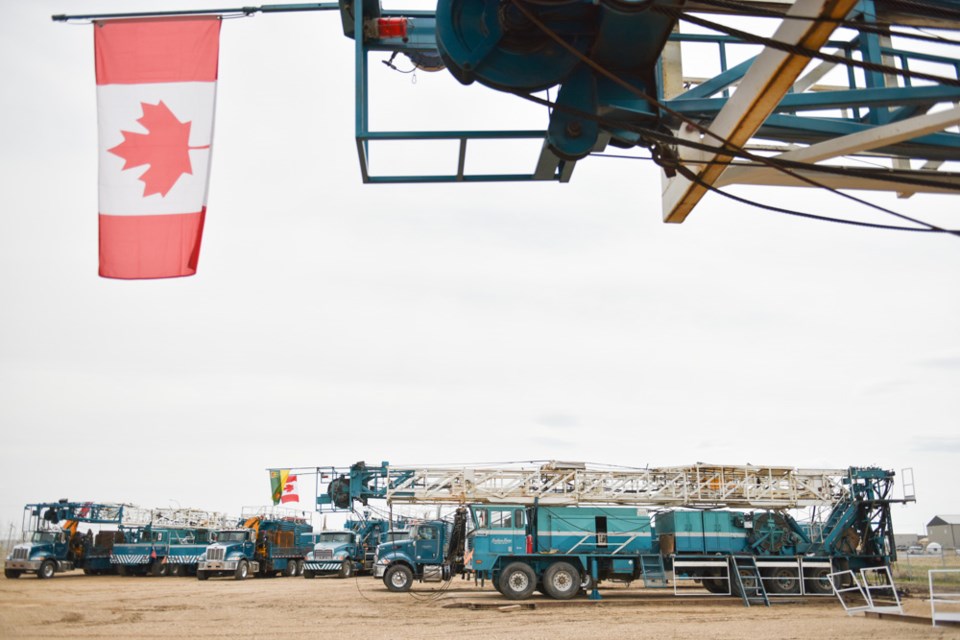We’ve been hearing about this for a while, and this month, it was time to do something about it.
Almost every service rig company we’ve spoken to in the province could use a few more hands.
Beyond the companies that are featured in this edition, there were several more we spoke to, but for one reason or another, weren’t able to do a story on. But that doesn’t mean they don’t need people. They do, and in all areas of the province. A lot of service rig companies have billboards along roads, looking for people to come in and apply.
For nearly all the service rig outfits we spoke to, they could use two to six hands. Many were running around 75 per cent capacity. If they had enough people, they could possibly crew up another rig and put it to work. That would require another five people.
Of the ones that had adequate staff right now, they noted if they could put another rig out to work, they’d need more people in a hurry, and they’d have a hard time finding them.
But, and there is definitely a but, having enough work to keep that extra rig working seems to be an issue across the sector.
The sporadic nature of the work, especially given its susceptibility to wet weather during the warm months, makes it difficult to attract, and retain workers. Look at the difficulty farmers had with harvest this year. If its too wet to go in the fields, it’s likely too wet to go onto the lease right beside that canola. Some areas in the southeast had eight inches of rain in the fall. That turned leases into soupholes. Only a good, hard freeze-up will make those areas workable.
And then, of course, there is spring breakup, which can sometimes take forever to end.
As for the sporadic nature, it’s difficult to provide any sort of real schedule for service rig workers. We heard that from almost anyone. Several companies have tried various rotations, like 12 and two, 11 and three, 10 and four or five and two, something approaching a “normal” workweek. But most of the companies had a hard time finding something that worked. A few basically gave up. When a well goes down and it’s a scheduled weekend off, the oil company still wants that well fixed, and pronto. So much for the weekend off.
This is one of the prime reasons most of these service rig companies need a handful of people – primarily to fill in the gaps. If someone needs to book time off, or a holiday, or a wedding, the company needs people to make up for those spots.
But if you don’t know, for sure, that you can provide enough work for that additional relief staff, sometimes senior management – field supervisors and even owners – step in and fill shifts. We heard of that quite a bit.
In both Lloydminster and Weyburn, we heard of two companies in each of those communities, respectively, working together, essentially sharing a few workers. If company A was short, they would call up company B, and vice versa, trying to keep hands busy and rigs moving. It obviously makes a big difference when these competitors get along. One company suggested it wouldn’t be such a bad idea to have a small pool of workers, maybe a whole crew, that could act as a relief for a few companies.
There’s another reason why the numbers of two to five additional hands has been consistent. With five-man crews, you can only bring on so many green hands before you dilute the skillset on an individual rig. That generally means only one new or newer hand per rig at any one time, starting on the rig floor.
There were a few words we heard a lot: “good hands” and “experienced hands.” Consistently the owners and managers we spoke to were looking for people that fit both those descriptions.
One pointed out the importance of being able to pass a drug test. Marijuana may have been legal in Canada for the past year, but the oil companies want none of it on their sites. If you can’t pass a drug test, you won’t be hired.
Another thing we heard is there aren’t that many people from Eastern Canada coming out to Saskatchewan to work on service rigs these days. For some companies, that was a consistent labour pool they used to draw from. But with reduced hours compared to the boom times, and sometimes sporadic work, it makes it a lot less enticing for both the employee to come across a continent for work, and the employer to bring them that far. As a result, local hires are preferred.
So yes, there are jobs out there that pay well, but involve hard work outdoors in all sorts of weather. In winter, that means damned cold weather. The hours can be long, but they aren’t as long as they were five years ago. Spring breakup is lean time. It’s generally been a young man’s game, but there’s nothing saying women can’t work on service rigs either. And we heard of one rig hand in his sixties.
So if you are looking for work, take your resume to almost any service rig company. There’s a good chance you could be hired.



